In Quadrant Structured Products v. Vertin et al, the Delaware Court of Chancery held in an opinion issued October 1, 2014, and again confirmed in relevant part on October 28, 2014, that lenders do not have direct claims against directors of a company for breach of fiduciary duty, and the directors do not owe fiduciary duties to the company’s lenders, but if a company is in the zone of insolvency, lenders do have the right to bring a derivative claim, just as a shareholder would under normal circumstances.
Background
When a company is in financial difficulty, its shareholders and lenders often find themselves at odds. This is particularly true when the company has been through several rounds of financing, because holders of preferred stock have first right to the company’s assets in a liquidation, and even though they are shareholders, they are also pseudo-creditors. During the last recession, lender’s lawyers creatively asserted claims against company directors, first claiming that when a company was broke or nearly broke (in the “zone of insolvency”), the directors owed fiduciary duties to the lenders. When that didn’t work, they claimed that directors breached their fiduciary duties to the company by making risky business decisions that put a troubled company deeper in debt. These came to be known as the “zone of insolvency” claims.
Because a large percentage of U.S. companies are incorporated in Delaware, and many other states follow Delaware law on matters of corporate governance and fiduciary duties, Delaware courts addressed these arguments frequently from 2004 through 2010.
Company Directors or Mangers do NOT Owe Fiduciary Duties to Lenders
First, Delaware courts made it clear that directors (corporations), managers (LLCs), and general partners (partnerships) owe fiduciary duties to the entity, not to its owners, and not to its creditors. Production Resources Group, L.L.C. v. NCT Group, Inc., 863 A.2d 772, 792 (Del. Ch. 2004); North American Catholic Educational Programming Foundation, Inc. v. Gheewalla, 930 A.2d 92, 101 (Del. 2007). It has long been law that shareholders cannot sue directors for breach of fiduciary duty, because fiduciary duties are owed to the company, not to individual shareholders. Instead, they must bring a “derivative” action – a law suit against the company, to cause the company to sue its directors. When lenders tried to sue directors for breach of fiduciary duty, Delaware courts turned them away also – in Gheewalla the court held: “The directors of Delaware corporations have the legal responsibility to manage the business of a corporation for the benefit of its shareholder owners,” and denied creditors the right to sue directors for breach of fiduciary duty. However, the court also held that once a company is broke, its creditors also have the right to bring a derivative suit for breach of fiduciary duty – like shareholders, lenders can sue the company to cause the company to sue its directors for breach of fiduciary duties.
Insolvency Does Not Expand the Usual Fiduciary Duties
Based on the decisions in Production Resources and Gheewalla, lenders next brought derivative claims asserting that if a company is in financial trouble (in the zone of insolvency), the directors have a duty to manage the company for the benefit of its creditors, and not make risky decisions that could lead to the company going broke, or “deepening its insolvency.” The argument goes like this: When a company is in trouble, the directors often take big risks, entering into questionable deals that, if successful will save the company, but have a high risk of failure. A risky deal that destroys the company leaves little for the creditors, but if the directors instead act to preserve the remaining assets for the creditors, they will at least get some if not all of their money back. If a company has significant debt, shareholders of troubled companies support taking bet-the-company risk – they have already lost their investment to the lenders, who get first pick. Thus, they have nothing to lose.
Delaware courts do not support the lenders argument that fiduciary duties shift to benefit the lenders: “…if a solvent corporation is navigating in the zone of insolvency, the focus for Delaware directors does not change: directors must continue to discharge their fiduciary duties to the corporation and its shareholders by exercising their business judgment in the best interests of the corporation for the benefit of its shareholder owners.” Gheewalla, 930 A.2d at 101, See also Trenwick American Litig. Trust v. Ernst & Young, L.L.P., 906 A.2d 168, 202-203 (Del. Ch. 2006) affd., 931 A.2d 438 (Del. Supr. 14 Aug 2007). The business judgment rule, as developed and refined over the years, particularly in Delaware, encourages risk and protects directors from risky decisions that do not work out, so long as they are taken properly and fairly.
Quandrant Structured Products v. Vertin
The Delaware Court of Chancery addressed this issue again recently. In Quadrant Structured Products v. Vertin et al, Athilon Capital, a company that sells credit protection to large financial institutions, guaranteed credit default swaps on collateralized debt obligations sold by its wholly-owned subsidiary. During the 2008 financial crisis, Athilon was deep into the zone of insolvency. Another company, EBF, bought all of the Athilon’s Junior Subordinated Notes and all of its equity, gaining control over Athilon. Thereafter, Quadrant Structured Product bought Athilon’s Senior Subordinated Notes.
EBF, now in control of Athilon, but in a junior security position, decided (1) not to exercise its right to defer interest payments to itself on the junior notes, (2) to pay above-market service and licensing fees to its own affiliate, and (3) to adopt a new, riskier business strategy instead of dissolving Athilon, which would have benefited other creditors like Quadrant. Since EBF’s notes were junior to Quadrant’s notes, EBF would get nothing in a liquidation, but could benefit if the risky strategy worked – they already had nothing, so all of the risk of EBF’s strategy fell on Quadrant. In short, a junior lender was able to improve its position over a senior lender by taking over the company and making decisions to its benefit. Quadrant, the senior creditor, sued the new directors, claiming that since the company was in the zone of insolvency, the directors breached their fiduciary duties by not making business decisions to benefit the senior lenders.
The Delaware court held that the directors’ decision to try to increase the value of the insolvent corporation by adopting a highly risky investment strategy was allowed under the “business judgment rule,” even though Quadrant and other senior creditors bore the full risk if the strategy failed. Vice Chancellor Laster held: “In the case of an insolvent corporation, board decisions that appear rationally designed to increase the value of the firm as a whole will be reviewed under the business judgment rule, without speculation as to whether those decisions might benefit some residual claimants more than others.”
The ruling makes it clear that, at least in Delaware, even though creditors gain the rights of shareholders to bring a derivative action when a company is in the zone of insolvency, that right does not include a shift of fiduciary duty from the company to the creditors. The directors’ duty remains to the company, and decisions normally protected by the business judgment rule do not lose that protection just because a company is going broke.
It should also be noted that the Delaware court remained consistent by holding that the directors’ decisions not to defer interest on the notes held by the junior creditor, and to pay above-market fees to an affiliate of the junior creditor, were conflicting interest transactions subject to entire fairness review, and not purely protected by the business judgment rule. That portion of the decision would have been the same without a “zone of insolvency” situation, and those claims were not dismissed.




